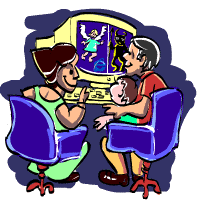Like most parents, you may have asked your children to be wary of strangers, made a list of television shows, movies and videos that you could watch and where and how far from home they may travel. It’s important to make similar rules when your children use the Internet and to be aware of their online activities.
You’ll also want to make sure that surfing the Net doesn’t take the place of homework, social activities or other important interests. You might even set an alarm clock or timer if you or your child tend to lose track of time.
This section offers tips for ensuring that your children have safe, productive and enjoyable experiences on the Internet.

Being Net Wise [Illustration by Shiju George]
Just as we tell our children to be wary of strangers they meet, we need to tell them to be wary of strangers on the Internet. In any of the ‘chat rooms’ especially, most people behave reasonably and decently, but some may be rude, mean or even criminal. Make your children understand that they should:
- Never give out personal information (including their name, home address, phone number, personal email-identity, age, race, family income, school name or location or friends’ names) or use a credit card online without your permission.
- Never share their password, even with friends.
- Never arrange a face-to-face meeting with someone they meet online unless you approve of the meeting and go with them to a public place.
- Never respond to messages that make them feel confused or uncomfortable. They should ignore the sender, end the communication and tell you or another trusted adult right away.
- Never use bad language or send mean messages online.Also, make sure your children know that the people they meet online may not always be who and what they say they are and that the nformation they give out thinking that it is for private purposes may not remain private.
Read the Right Stuff
- Even without trying, your children could come across materials on the Internet that may be obscene, pornographic, violent, hate filled, racist or offensive in other ways. One type of material – child pornography – is illegal. While other offensive material is not illegal, there are steps you could take to keep it away from your children and out of your home.
- Try to make sure your children understand what you consider appropriate for them. What kinds of sites are they welcome to visit? What areas are off limits? How much time can they spend and when? Set out clear, reasonable parameters for your child.
- Try to make online exploration a family activity. You could place the computer in the living room or family room. This arrangement would involve everyone and would help you monitor what your children may be doing.
- You could pay attention to games your older child might download or copy. Some may be re violent or contain sexual content.
- It would be a good idea to check the software or online services that filter out offensive materials and sites. Options include stand-alone software that can be installed on your computer, and devices that label or filter content directly on the web.In addition, many Internet Service Providers and commercial online services offer site blocking, restrictions on incoming e-mail, and children’s accounts that access specific services. Often, these controls are available at no additional cost. Be aware, however, children are often smart enough to get around these restrictions. Therefore your constant supervision and involvement could be imperative.
Encourage the use of Internet
The Internet if used correctly and judiciously is a boon to humanity. Not only are you able to keep in touch with relatives living far away you can also gather a vast amount of information on every subject. In this way it brings people closer and offers unlimited resources for your child to tap into.
Although not all online information may be reliable, try to show your children how to use and evaluate information they find on the Internet. Some individuals and organisations are very careful about the accuracy of the information they post, but others may not be, and it is often noticed some even mislead on purpose.
Therefore encourage your child to use the Net for various science and environment projects that he may have to do, there will be many tips on how to go about using things, it helps you make great long distance friends but for this parental supervision is essential. Your child can play some great innovative games that can be downloaded. And soon you will realise your child knows much more than you.
Just as it is important to be aware of the potential risks involved in going online, it is equally important to keep them in perspective.










